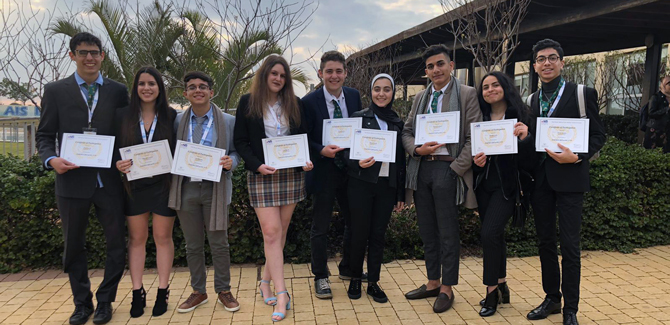The Seeds are always so nervous on the first day. No matter how much they prepare, it’s always a shock to the system. They come back eager to do more research—not because what they’ve already done isn’t good enough, but because they want to participate more and excel as representatives of Seeds of Peace.
By day two, they’re in “the zone,” and the edge they have over their peers is apparent. Soon they’re racing up to people who were complete strangers just one day ago, trying to get them to sign their resolutions.
I’m talking, of course, about the breakneck world of Model United Nations (MUN).
For the past few years, we have run a five-month binational workshop that simulates Model UN for Israeli and Palestinian Seeds, training them to participate in independent conferences throughout the region. Model UN isn’t integrated into the academic system of most of our schools here, so for many Seeds, this is the first—and only—opportunity they have to experience one.
The program introduces Seeds to the inner structures and procedures of the UN as well as to international diplomacy and policy-making. During the workshop, Seeds learn diplomatic skills such as how to craft a policy statement, how to structure a speech, and how to write a resolution, as well as skills like debate and public speaking.They have to research a given issue, the country they are representing, and the country’s policy on that issue.
As much as I wish that every Seed who attends takes a path related to the UN and policymaking, these skills are vital to so many fields. Even something as simple as learning how to format an email properly can take them so much farther so much sooner in their lives, and I can tell you from personal experience that these skills aren’t being taught even in the best schools here.

The program culminates in a mock Model UN conference exclusively for participants in the workshop. Additionally, we send eight participants each as delegates to the two largest Model UN conferences in the region: TIMEMUN (The Israeli-Middle East Model United Nations) in Tel Aviv and GALMUN (the Galilee Model United Nations) in Nazareth. In each conference, participants represent different committees of a single nation: the Economic and Social Council, the Security Council, Trade, Development, Territorial Disputes, etc.
This year at TIMEMUN, we had a Palestinian student from the West Bank participate in the conference. She was definitely shy at first. But that night, she was so eager to have me look over her opening speech and review her notes. I could tell how much she wanted to participate, and I think she just needed extra reassurance that she was more than capable of holding her own.
By the second day, she had completely come out of her shell. Rather than being afraid and out of her comfort zone as a Palestinian at a conference in Even Yehuda, she embraced the fact that this was such a unique opportunity. After the conference ended, she sent me a letter telling me how important the experience was for her, and how empowered she felt leaving it. She told me that pursuing policymaking as a career was a life path she didn’t even consider or imagine she would enjoy before.
At GALMUN, we represented Saudi Arabia right around the time of the Khashoggi assassination. One of our Seeds was on the Human Rights Committee, and she had this incredible challenge: do I stick with my own personal beliefs and show respect for human rights, or do I give my country’s policy statement on it as a representative?
There’s always this tension in Model UN when your own values don’t align with those of the country you represent. But it’s so important that young people have an opportunity like this to experience different policies and different perspectives. Like Camp, Model UN expands your mindset from beyond where you come from, to make you more aware of the international community.
In this Seed’s case, the circumstances were an extreme version of the work we do in dialogue and in regional programs: putting yourself in a mindset that you may very strongly disagree with, to fully understand the thinking behind it.
Our society needs to provide young people with more activities that empower them as leaders, and that challenge them to sit with worldviews different from their own. Creating these opportunities is key to Seeds continuing their growth after Camp. As a Seed who participated in Model UN myself, I can’t think of a better place to start.
To learn more about the Model United Nations program, contact Mirna at mirna@seedsofpeace.org.

